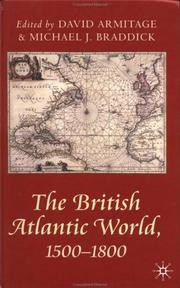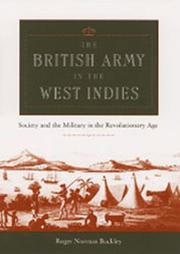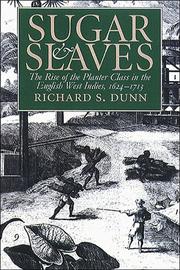| Listing 1 - 10 of 23 | << page >> |
Sort by
|
Book
ISBN: 0511783272 1108023703 Year: 2011 Publisher: Cambridge : Cambridge University Press,
Abstract | Keywords | Export | Availability | Bookmark
 Loading...
Loading...Choose an application
- Reference Manager
- EndNote
- RefWorks (Direct export to RefWorks)
James Anthony Froude was a prominent Victorian historians in England, though he was often controversial and opinionated, especially towards Catholicism. His biography of Carlyle in 1884, with his emphasis on Carlyle's weaknesses as well as his brilliance, caused lasting offence to many. He then began travelling in British colonies, which led to the publication of Oceana (1886) and The English in the West Indies (1888) which combined anecdotes and observations with Froude's opinions on the British Empire. The latter provoked many angry responses to his views on how the colonies should be governed. He favoured self-government, but feared that democracy would cause the British islands to go the same way as French Haiti, stating that black rule in Grenada would led to a rapid return to savagery. As well as political opinions, the book contains vivid descriptions of the islands and their inhabitants.
West Indies, British --- Description and travel. --- Politics and government --- British West Indies --- Commonwealth Caribbean --- West Indies
Book
ISBN: 0511791674 1108024769 Year: 2012 Publisher: Cambridge : Cambridge University Press,
Abstract | Keywords | Export | Availability | Bookmark
 Loading...
Loading...Choose an application
- Reference Manager
- EndNote
- RefWorks (Direct export to RefWorks)
Bryan Edwards was a wealthy West Indian planter, politician and historian. He vigorously opposed the abolition of the slave trade, since the sugar industry relied heavily on it. His most important work was The History, Civil and Commercial, of the British Colonies in the West Indies, originally published in two volumes in 1793, and subsequently expanded (this fifth edition of 1819 reaching five volumes) with many plates and maps. In this work, he described his aim as 'to describe the manners and dispositions of the present inhabitants, as influenced by climate, situation, and other local causes - an account of the African slave trade, some observations on the negro character and genius, and reflections on the system of slavery established in our colonies'. Volume 2 includes a description of the present inhabitants of the islands, the practice of slavery, government and commercial activity.
West Indies, British --- History --- Commerce --- Social conditions --- British West Indies --- Commonwealth Caribbean --- West Indies
Book
ISBN: 0511791666 1108024750 Year: 2012 Publisher: Cambridge : Cambridge University Press,
Abstract | Keywords | Export | Availability | Bookmark
 Loading...
Loading...Choose an application
- Reference Manager
- EndNote
- RefWorks (Direct export to RefWorks)
Bryan Edwards (1743-1800) was a wealthy West Indian planter, politician and historian. He vigorously opposed the abolition of the slave trade, since the sugar industry relied heavily on it. His most important work was The History, Civil and Commercial, of the British Colonies in the West Indies, originally published in two volumes in 1793, and subsequently expanded (this fifth edition of 1819 reaching five volumes) with many plates and maps. In this wide-ranging work, he described his aim as 'to describe the manners and dispositions of the present inhabitants, as influenced by climate, situation, and other local causes; an account of the African slave trade ... and reflections on the system of slavery established in our colonies'. Volume 1 covers the physical geography of the area, its early inhabitants, and the discovery and settlement by Europeans.
West Indies, British --- History. --- Commerce. --- British West Indies --- Commonwealth Caribbean --- West Indies
Book
ISBN: 0511751109 1108020321 Year: 2011 Publisher: Cambridge : Cambridge University Press,
Abstract | Keywords | Export | Availability | Bookmark
 Loading...
Loading...Choose an application
- Reference Manager
- EndNote
- RefWorks (Direct export to RefWorks)
James MacQueen was one of the most outspoken critics of the British anti-slavery campaign in the 1820s and 1830s. A former manager of a sugar plantation in the Caribbean, he was editor of the Glasgow Courier, a paper that favoured West Indian merchant interests and opposed rights for slaves. First published in 1824, this book is a direct attack on contemporary anti-slavery campaigners, such as William Wilberforce and Thomas Clarkson, whom MacQueen holds responsible for 'the dreadful misrepresentations scattered abroad' about West India colonies and the planters. MacQueen, who insists on calling himself an enemy of slavery 'in the abstract', argues that abolition in the colonies would lead to insurrections, bringing chaos and barbarism to these territories. This, in turn, would lead to the loss of the British colonies. This volume remains an essential document in the context of post-colonial studies.
Slavery --- History --- West Indies, British --- Abolition of slavery --- Antislavery --- Enslavement --- Mui tsai --- Ownership of slaves --- Servitude --- Slave keeping --- Slave system --- Slaveholding --- Thralldom --- Crimes against humanity --- Serfdom --- Slaveholders --- Slaves --- British West Indies --- Commonwealth Caribbean --- West Indies --- Enslaved persons
Periodical
ISSN: 15346714 Year: 1997 Publisher: Bloomington, Ind. : Indiana University Press
Abstract | Keywords | Export | Availability | Bookmark
 Loading...
Loading...Choose an application
- Reference Manager
- EndNote
- RefWorks (Direct export to RefWorks)
West Indies, British --- Caribbean, English-speaking --- Caribbean Islands. --- Ethnic & Cultural Studies. --- Antilles britanniques --- Antilles anglophones --- Caribbean Area, English-speaking. --- West Indies --- British West Indies --- Commonwealth Caribbean --- Anglophone Caribbean --- Caribbean Area --- English-speaking Caribbean --- Caribbean, Anglophone --- Caribbean Area, English-speaking --- English-speaking Caribbean Area.

ISBN: 0333963407 0333963415 Year: 2002 Publisher: Basingstoke Palgrave Macmillan
Abstract | Keywords | Export | Availability | Bookmark
 Loading...
Loading...Choose an application
- Reference Manager
- EndNote
- RefWorks (Direct export to RefWorks)
British --- British people --- Britishers --- Britons (British) --- Brits --- Ethnology --- History --- America --- Caribbean Area --- Great Britain --- United States --- West Indies, British --- British West Indies --- Commonwealth Caribbean --- West Indies --- Colonies --- History. --- History of the United Kingdom and Ireland --- History of North America --- History of Latin America --- anno 1500-1799 --- Caribbean area

ISBN: 0813022274 9780813022277 0813016045 Year: 1998 Publisher: Gainesville, Fla. : University Press of Florida,
Abstract | Keywords | Export | Availability | Bookmark
 Loading...
Loading...Choose an application
- Reference Manager
- EndNote
- RefWorks (Direct export to RefWorks)
"This Social and Political history depicts a military community being shaped and defined in an era of revolutionary change: the French Revolution and the Napoleonic wars at the end of the eighteenth century. Within the framework of war and society, Roger Buckley gives us a detailed picture of the British West Indies army in the Caribbean theater, especially the manner in which the garrison affected, and was itself affected by, the Caribbean social, political, and economic landscape."--Jacket.
Garrisons, British --- Sociology, Military --- Military & Naval Science --- Law, Politics & Government --- Armies --- Military sociology --- Armed Forces --- Peace --- War --- War and society --- British garrisons --- History. --- History --- Great Britain. --- England and Wales. --- Angliǐskai︠a︡ Armii︠a︡ --- Tsava ha-Briṭi --- British Army --- בריטניה. --- צבא הבריטי --- Military life. --- West Indies, British --- British West Indies --- Commonwealth Caribbean --- West Indies --- Social conditions. --- History, Military.
Book
ISBN: 1435694791 9781435694798 Year: 1996 Publisher: Barbados : The Press, University of the West Indies,
Abstract | Keywords | Export | Availability | Bookmark
 Loading...
Loading...Choose an application
- Reference Manager
- EndNote
- RefWorks (Direct export to RefWorks)
"Collection of essays written by former students, colleagues, and friends to honor a preeminent economic historian of the Caribbean. Covering period 1650-1850, essays encompass a broad range of topics, with major focus on various aspects of slavery and imperial relations during those years. Excellent introductory essay on Sheridan's contributions to Caribbean economic history. Extremely useful"--Handbook of Latin American Studies, v. 58.
Slavery --- Abolition of slavery --- Antislavery --- Enslavement --- Mui tsai --- Ownership of slaves --- Servitude --- Slave keeping --- Slave system --- Slaveholding --- Thralldom --- Crimes against humanity --- Serfdom --- Slaveholders --- Slaves --- West Indies, British --- British West Indies --- Commonwealth Caribbean --- West Indies --- Economic conditions --- History --- History. --- Economic conditions. --- Enslaved persons

ISBN: 0807899828 1469600420 9781469600420 0807811920 9780807811924 0393006921 9780393006926 0807848778 Year: 1972 Publisher: Chapel Hill, Published for the Institute of Early American History and Culture at Williamsburg, Va., by the University of North Carolina Press
Abstract | Keywords | Export | Availability | Bookmark
 Loading...
Loading...Choose an application
- Reference Manager
- EndNote
- RefWorks (Direct export to RefWorks)
Sugar --- Cane sugar --- Sugarcane products --- Sugars --- Manufacture and refining --- West Indies --- West Indies, British --- British West Indies --- Commonwealth Caribbean --- History --- Social life and customs. --- Slavery --- Plantation life --- Country life --- Abolition of slavery --- Antislavery --- Enslavement --- Mui tsai --- Ownership of slaves --- Servitude --- Slave keeping --- Slave system --- Slaveholding --- Thralldom --- Crimes against humanity --- Serfdom --- Slaveholders --- Slaves --- Enslaved persons
Book
ISBN: 9781108526128 9781108423465 9781108437585 Year: 2018 Publisher: Cambridge Cambridge University Press
Abstract | Keywords | Export | Availability | Bookmark
 Loading...
Loading...Choose an application
- Reference Manager
- EndNote
- RefWorks (Direct export to RefWorks)
"Black British Migrants in Cuba offers a comprehensive study of migration from the British Caribbean to Cuba in the pre-World War II era, spotlighting an important chapter of the larger trajectory of the Afro-Atlantic diaspora. Grounded in extensive and rigorous multi-sited research, this book examines the different migration experiences of Jamaican, Leeward, and Windward Islanders, along with the transnational processes of labor recruitment and the local control of workers in the plantation. The book also explains the history of racial fear and political and economic forces behind the marking of black migrants as the 'Other' and the resulting discrimination, racism, and violence against them. Through analysis of the oppositional and resistance strategies employed by British Antilleans, the author conveys migrants' determination to work, live, and survive in the Caribbean." -- Publisher's description
Blacks --- Migrant labor --- Sugar workers --- Sugar trade --- Labor, Migrant --- Migrant workers --- Migrants (Migrant labor) --- Migratory workers --- Transient labor --- Employees --- Casual labor --- Negroes --- Ethnology --- History --- Social conditions --- West Indies, British --- Cuba --- British West Indies --- Commonwealth Caribbean --- West Indies --- Küba --- Guba --- Kkuba --- Republic of Cuba --- República de Cuba --- キューバ --- Kyūba --- Kuuba --- Emigration and immigration --- Social aspects. --- Economic aspects. --- Relations --- Black persons
| Listing 1 - 10 of 23 | << page >> |
Sort by
|

 Search
Search Feedback
Feedback About UniCat
About UniCat  Help
Help News
News